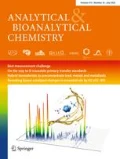The 43rd annual meeting of the German Society for Mass Spectrometry (Deutsche Gesellschaft für Massenspektrometrie, DGMS) took place in Halle/Saale, Germany, from March 7 to 10, 2010. The conference was hosted jointly by the Martin-Luther University Halle-Wittenberg and the Leibniz Institute for Plant Biochemistry, Halle. Lectures, poster sessions, lunch seminars, and company exhibitions were held in the main buildings of the University in the heart of 1200-year-old Halle. An impressive conference attendance of 375 participants presented their work in 168 posters, 42 talks, and six plenary lectures. Moreover, 26 companies used the chance to exhibit and discuss novel product developments during the meeting.
Participants from various national and international universities, scientific disciplines, and industry gathered to disseminate information about the latest developments in mass spectrometry. The program offered a wide variety of different aspects of mass spectrometry, for example instrument development, new developments in fundamental science, and novel applications of mass spectrometry to address specific questions in chemistry, biology, medicine, geology, forensics, and physics. Four workshops preceded the conference: “Elemental Mass Spectrometry and Proteomics” (J.S. Becker, Jülich), “Basics of Mass Spectrometry” (D. Kuck, Bielefeld and M. Schäfer, Cologne), “Computational Mass Spectrometry” (S. Neumann, Halle/Saale), and “Bioaffinity Mass Spectrometry in Life Science and Biomedical Analysis” (M. Przybylski, Konstanz and M.O. Glocker, Rostock).
The conference was opened in the Audimax Lecture Hall by the president of the DGMS, Jürgen Grotemeyer, the pro-rector of the Martin-Luther University Halle-Wittenberg, Joachim Ulrich, and the local organizers, Jürgen Schmidt and Andrea Sinz. Musical interludes by the “Concentus Musicus” string quartet created an appropriate introduction for the award ceremony, in which the Medal of Honor of the DGMS was presented to Hans-Joachim Dietze who unfortunately was unable to attend the ceremony. The prestigious “Wolfgang Paul Lecture“ was given by Peter Roepstorff (Odense, Denmark) who was honored for his significant contributions to the development of mass spectrometry in the life sciences.
The topics of the plenary lectures ranged from new developments in ionization techniques to applications of mass spectrometry in toxicology and protein chemistry. Julia Laskin (Richland, USA) talked about soft-landing of complex ions on self-assembled monolayer surfaces. Karl Mechtler (Vienna, Austria) discussed different aspects of quantification of protein complexes. Hans H. Maurer (Homburg, Germany) gave an impressive overview of the current status of hyphenated mass spectrometry in clinical and forensic toxicology, and Renato Zenobi (Zurich, Switzerland) revealed new perspectives of on-line/on-site analysis by extractive electrospray mass spectrometry (EESI-MS). A guest talk about archeological discoveries in central Germany, presented by State archeologist Harald Meller, gave fascinating insights into the history of this region. In a rather humorous closing lecture Wolf D. Lehmann (Heidelberg, Germany) debated the challenges in daily life for a mass spectrometrist.
The Conference dinner was held on March 9 in the historical halls of Moritzburg Castle in the center of Halle, which was certainly a most impressive event for all participants. For those interested in art and architecture guided tours were offered through the exhibition rooms of the castle.
In conclusion, the conference was highly successful both with regard to the high quality presentations and the intensity of the discussions. A number of presentations are published in this special issue and give an impression of the various topics covered at the conference. We would like to thank the authors for their excellent contributions and all participants at the conference for joining us in Halle.
Author information
Authors and Affiliations
Corresponding author
Additional information
Published in the special issue Mass Spectrometry (DGMS 2010) with Guest Editors Andrea Sinz and Jürgen Schmidt.
Rights and permissions
About this article
Cite this article
Sinz, A., Schmidt, J. Forty-third annual meeting of the German Society for Mass Spectrometry. Anal Bioanal Chem 398, 2777–2778 (2010). https://doi.org/10.1007/s00216-010-4216-4
Published:
Issue Date:
DOI: https://doi.org/10.1007/s00216-010-4216-4

